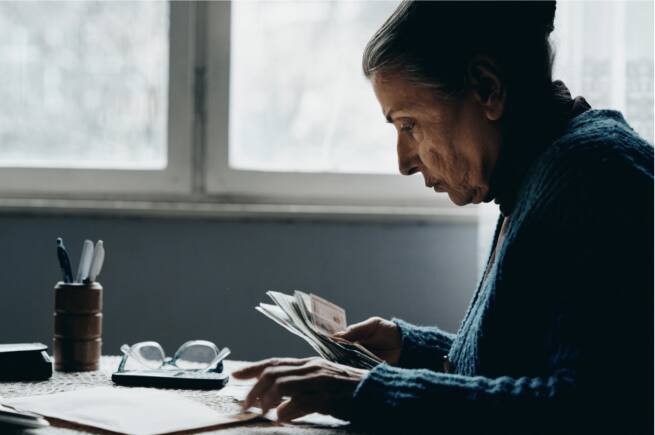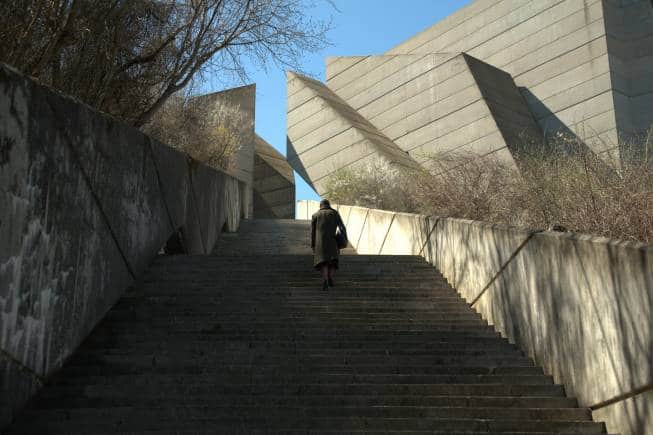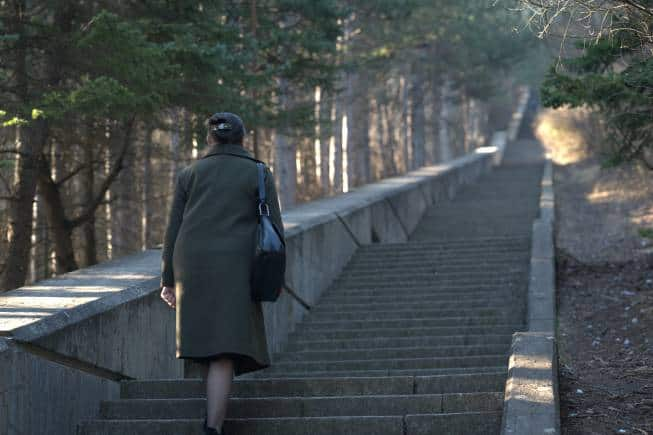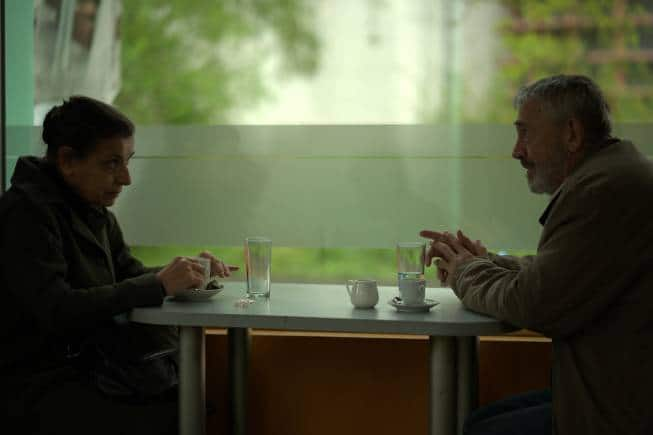



Not too far back, my father lost the money in his bank account to a phone scammer. Not only did Stephan Komandarev’s latest film Blaga’s Lessons hit home, it made me — who’d chided her father for being gullible — to see the vulnerability of an elderly protagonist in such a situation. The Bulgarian film, which marks the comeback of 1980s star Eli Skorcheva, is a unique crime thriller with a universal theme, one many Indians will relate to. Skorcheva commands your attention in every frame as Blaga, a former teacher, who lives alone and is counting her pennies to get the best coffin for her just-expired husband but in a twist of fate, loses her life’s savings to phone scammers. Blaga’s transgression thereafter, somehow, feels cathartic. Here is a society of a lost dream, wedged between the past’s fallen Stalinist-communist totalitarianism and present’s market economy. Its future (the young) has left the country, for economic reasons. When was the last time we watched an entire no-frills thriller, laced with dark humour, steered by an elderly protagonist?
Blaga’s Lessons has won Komandarev the Silver Peacock for Best Director at the 54th International Film Festival of India (IFFI), Goa, this week, with Skorcheva in attendance. The film, the final installment in a trilogy, is Bulgaria’s official entry for the 2024 Academy Awards and will be screening at the American Film Institute’s AFI Silver Theatre and Cultural Centre, Maryland, the US, on December 3-4. In an exclusive email interview to Moneycontrol, Komandarev, 57, based in Sofia, the Bulgarian capital, who has been making social-realist films since the turn of the millennium, scanning contemporary ills, talks about his films and the Bulgarian society:
Blaga’s Lessons just showed at IFFI. Is this the first time a film of yours is being shown in India?
In 2014, I was at IFFI with my film The Judgment. I have wonderful memories of being there, amazing atmosphere and great films. Now, I am proud that we are participating again with Blaga’s Lessons and our two wonderful actresses Eli Skorcheva and Rozalia Abgarian are present at the festival.
Blaga’s Lessons has also been selected as Bulgaria’s entry for the Oscars 2024; this is the third time a film of yours will be sent to the Academy Awards. How does that feel?
Yes, the third time. The first time, we reached the shortlist was with the film The World is Big and Salvation Lurks Around the Corner in 2010. The second time was in 2015 with the film The Judgment. Now, with Blaga’s Lessons, we start the race from a much better position after the world premiere at the Karlovy Vary International Film Festival and winning two Crystal Globes (Best Film and Best Actress). Since then, we have won 15 more awards, the latest being the Grand Jury Prize at the Rome Film Fest. It’s a big responsibility, with a lot of work and organisation, to represent our film in a decent way.
Tell us a little about how you started making films and the kind of stories that propelled you towards that.
I graduated in medicine in Sofia in 1993 and started working as a doctor at the Clinic of Child Psychiatry in Sofia. I worked for five years and it so happened that I made a turn to cinema and graduated in film directing. I made both feature films (around six) and documentaries (about nine). I was always looking for real-life stories, very often, subjects and themes I found while making my documentaries inspired my feature films.
How has Bulgarian cinema, known for pioneering works in the field of animation, evolved over time and where do you see your filmography in that?
Bulgarian cinema has many faces, different genres and styles. And that’s great. I belong to that group which is looking for more social themes, a more realistic picture of the situation in our country. With our films, we try to make a diagnosis and analysis of Bulgarian and European society in the hope of provoking discussion and reflection among the viewers. And, thus, seek change towards a better and fairer society.
 Eli Skorcheva in a still from 'Blaga's Lessons'.
Eli Skorcheva in a still from 'Blaga's Lessons'.
What was the idea behind making Blaga’s Lessons? Is this the final film in your trilogy on social and moral ills in contemporary Bulgaria, after Directions (2017) on taxi drivers and Rounds (2019) on night patrol police?
The three themes or trilogy wasn’t planned from the beginning, we found the ‘characters’ of each subsequent film on the fly. My earlier films also dealt with themes of the communist past and its impact on our lives today. But gradually my focus shifted to the issues of the here and now, somehow deciding that over 30 years after the fall of Communism, we can’t forever use it to justify our failures today.
After the previous two films, which presented social problems in contemporary Bulgaria (and Europe) through the characters of taxi drivers (Directions) and policemen (Rounds), together with the screenwriter Simeon Ventsislavov, we decided that we should look at another group — the generation of our mothers and fathers. The Bulgarian pensioners turned out to be the biggest victims of the so-called ‘transition’ from a totalitarian system to a market economy — the time from 1989 to today. These people, who have worked and worked hard and honestly all their lives, have lost basic security and safety, normal food, adequate medical care, heating and so on. Not to mention cultural life and entertainment. Their children emigrated (one-third of the population left the country), and many old people were left alone in poverty and loneliness. And even worse — they lost their dignity. The phone scams are just an occasion to tell about these people. A horrific practice that further ruins the lives of pensioners. And yes, I and many of my friends have relatives who have been victims of such scams.
The choice of an elderly woman as a protagonist for your film — is that a commentary on women being more susceptible to crime?
The main reason is that the prototype of Blaga is one of my teachers of Bulgarian language and literature, who has left lasting memories in me. We used many of her traits and style of behaviour to create the character of Blaga. Otherwise, in our research, we met many victims of phone scams of both sexes, without the dominance of one.
 A still from 'Blaga's Lessons'.
A still from 'Blaga's Lessons'.
The Bulgarian Cryptoqueen Ruja Ignatova is among the FBI’s top 10 most wanted list. Have you heard of her?
I am not familiar enough with the case of Ruja Ignatova and it is difficult for me to comment.
The film spotlights the financial oppression of senior citizens, did you witness any such experience first-hand?
Yes, I was close to my elderly parents in the last years of their lives. I did my best to preserve their dignity. I was by their side, trying to help them in every way. Even though my father was a famous professor of the Bulgarian Academy of Sciences and my mother was a renowned translator of French, their pensions were very low and were enough for medicine and some kind of sustenance. There were also attempts at telephone fraud against my father, fortunately unsuccessful.
Among the developing nations, Bulgaria is ascribed as an upper-middle-income nation by the World Bank but is among the poorest nations in the European Union, if you could describe the Bulgarian economic and social demography?
Much of the young and educated population has emigrated in recent decades. There is a large proportion of the elderly population. I am not an expert on the Bulgarian economy, but the average income is well below the average for the European Union. The biggest problem, in my opinion, is the great social inequality, the scissorred gap between the richest and the poorest is widening.
 A still from 'Blaga's Lessons'.
A still from 'Blaga's Lessons'.
Is there no social security in place? The police, as shown in the film, are equally unhelpful or not forthcoming. The old civilian is sandwiched between the lawmakers and the scammers, and has to take things in her own hand.
Yes, there is a social security system, but it does not work as we would like. The police do what they can, the previous film in the Rounds trilogy tried to honestly represent the real situation with the police as well. Things are not black and white. This ‘taking things in her own hands’ thing, which is also in the film, is developed based on several such true stories we came across. There is no bigger scriptwriter than life.
How did you develop Blaga’s character from a woebegone recent widow and caring language teacher to an insincere, heartless, selfish woman? She flips the switch from being a victim to being a party to the very crime that took away her life’s savings? Is that a comment on the system making criminals out of us?
Yes, all this is true. The development of the project lasted several years, including a year of research, meetings with victims of phone scams, police officers working on such cases, and we had a secret meeting with a real phone scammer. Then we developed the script in a very nice European film dramaturgy programme — MFI Script 2 Film Workshop. There, we built the dramaturgy of the script in a process of many discussions. The main goal was to be realistic, to avoid sentimentality, not to give ready-made answers, but to provoke the audience and make them ask questions — about our society, about the role of everyone in it, about the personal responsibility of injustice to be part of our lives... And there we came up with the open ending of the film.
 Eli Skorcheva in a still from 'Blaga's Lessons'.
Eli Skorcheva in a still from 'Blaga's Lessons'.
Tell us about casting Eli Skorcheva as Blaga. Is she a noted Bulgarian actor?
Eli Skorcheva was one of the stars of Bulgarian cinema in the 1980s. There were amazing films with her participation. After 1989, she deliberately stopped acting in cinema and television, frustrated by the over-commercialisation in this field. She completed another degree in insurance and finance and worked in these fields. We met her by chance, in a garden in Sofia, during the pandemic. At that time, she was cleaning offices early in the morning. It was like a dream come true that she agreed to read the script, which she enjoyed very much. And she became Blaga. Rarely in my career as a director have I had the good fortune to work with an actress of such class, with incredible sensitivity and eye for detail. It was as if the 30-year hiatus had preserved and developed these qualities in her. Of the 17 awards the film won, five were for Best Actress, including one Crystal Globe at Karlovy Vary. She came back after these 30 years in an impressive way.
The title has Lessons in plural, what were the many lessons that Blaga learns?
The title, like the film’s ending, is open to interpretation. The general idea is that she is an elderly teacher who, within the film’s action, gives but also receives lessons. Both change people’s destinies.
 A still from 'Blaga's Lessons'.
A still from 'Blaga's Lessons'.
And that’s the reason for the camera’s proximity to her? We see her in big close-ups, it maps her character graph as well as is a surveillance tool on her.
Yes, the cameraman Vesselin Hristov and I have been working together for many years. And here we have discussed the style of the film for a long time, every shot has been conceived and tested in advance. We wanted to be ‘close’ to Blaga, to enter into her psychology, into her process of transformation. In this direction, we worked with both close-ups with large out-of-focus shots around and behind her, as well as very general close-ups, and we used three different aspect ratios in the film.
What are you working on next?
We are preparing the feature film project Made in EU, which is in the process of pre-production for shooting in March. Last year, Made in EU was one of 15 projects selected at L’Atelier in Cannes (Film Festival). The project focuses on the exploitation of women seamstresses in Bulgarian textile factories during the COVID-19 epidemic in 2020.
Discover the latest Business News, Sensex, and Nifty updates. Obtain Personal Finance insights, tax queries, and expert opinions on Moneycontrol or download the Moneycontrol App to stay updated!
Find the best of Al News in one place, specially curated for you every weekend.
Stay on top of the latest tech trends and biggest startup news.